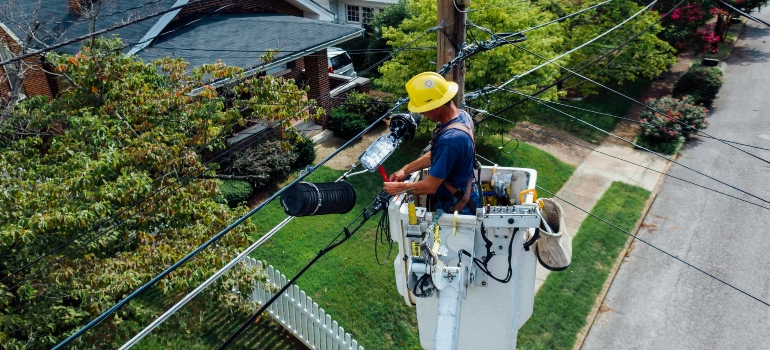Thinking about moving to an expensive city? It’s an exciting change, but high living costs can feel overwhelming. Planning your budget carefully is key to making the move easy. Even in a high-cost area, you can still enjoy city life without constantly worrying about money. The trick lies in smart budgeting and choosing reliable services. A2B Moving and Storage knows how to help people like you make smooth transitions to pricier cities. With these strategies, you’ll confidently manage your expenses while settling into your new surroundings. Ready to get a handle on city expenses? Explore and learn how to make your big move financially manageable. The city life you want is within reach!
Understanding the true cost of living
Living in an expensive city means facing costs that go far beyond just rent. To truly prepare, you need to understand the wide range of expenses that can come with a high-cost lifestyle. Rent is typically the biggest expense, often taking up a large part of your budget. In popular cities, even small apartments come with high prices, making it essential to know what’s affordable for you. Searching for apartments within your financial means is critical to avoid stress down the line.
Utilities add to your monthly bills and can catch you off guard. Electricity, water, gas, and the internet may seem minor on their own, but together they add up. If you’re moving to a city with extreme weather, like cold winters or hot summers, utility costs may climb due to heating or cooling. Plan for these expenses to avoid budget surprises.

Daily living expenses are another major part of city life. Grocery costs, public transit, and even a simple coffee run can all come at a premium in a big city. If you’re commuting, public transportation or gas and parking for your car will also impact your budget. Even in cities with strong public transportation, costs can still add up, especially if you rely on it daily. Think about how you’ll get around and what each option will cost.
These expenses can feel overwhelming, but being aware of them helps you make informed choices. With a full picture of city living costs, you’re better equipped to handle the financial challenges of moving to an expensive area. If you need help moving large items, movers Waldorf MD can provide budget-friendly assistance while making sure that your belongings arrive safely.
Creating a realistic moving budget
Creating a moving budget is one of the most important steps to keep your finances in check. Start with the basics: calculate essential costs like movers, packing materials, and any travel-related expenses. Consider hiring experienced professionals, such as DC apartment movers, who know how to navigate city moves efficiently. Hiring specialized movers helps you avoid unexpected costs and reduces stress on moving days.
Then, think about upfront housing expenses. Many rentals require a security deposit and the first and last month’s rent upfront, which can be a significant amount. Some places may also charge application or pet fees, so do your research in advance. These costs can quickly add up, so it’s crucial to budget for them. Also, consider any home adjustments, like buying curtains, furniture, or kitchen essentials.

Find opportunities to save where you can. Moving during the off-season, for example, can save you money, as demand for movers is lower. Many moving companies offer discounts if you book well in advance or bundle services. Look out for these kinds of deals, which can help stretch your budget. Setting aside funds for unforeseen expenses, like minor repairs or last-minute purchases, keeps your budget flexible and manageable.
Stick to your budget to avoid financial strain during your move. Planning each step carefully helps make sure that you’re not caught off guard. A realistic budget keeps your move easy. With your expenses laid out, you’ll have peace of mind and be ready to enjoy your new city life.
Finding affordable housing
Finding affordable housing in a high-cost city might seem like a challenge, but there are effective ways to do it. Begin your search early to give yourself enough time to look at different neighborhoods. Some areas in large cities are still affordable while offering solid amenities and convenient access to public transit. Often, neighborhoods on the rise provide a balance of cost and lifestyle perks, as they tend to have lower rents but still offer great options.
Use rental websites and local forums to scout deals. Many apartment-hunting apps allow you to set filters for budget and specific needs, which saves time and narrows down your choices. Engaging with rental agencies or specialists who know the area can also be a big help, especially if you’re coming from out of town. For those relocating from afar, international Movers DC area can provide logistical support and local expertise, making your move easier.

Living with roommates is another great way to keep costs down. Sharing rent and utilities can make city life significantly more affordable. If privacy is important, consider looking for compact studios or smaller apartments in safe, budget-friendly areas. Studios may be small but often have everything you need for comfortable city living.
By starting early and exploring various resources, you’ll be well-positioned to find a home that fits your budget. It’s possible to enjoy city life without sacrificing your financial goals. With careful planning and the right tools, finding a place that feels like home—and fits your budget—is achievable.
Packing smart
Packing efficiently can significantly cut down on moving costs. The first step is learning how to declutter. Go through each room and sort items you don’t need. Sell or donate things that no longer serve a purpose, as moving with fewer items reduces weight and saves you money on transportation. Plus, letting go of unneeded items can feel refreshing before a big move.
When it comes to packing, look for free or affordable supplies to save even more. Many grocery stores, liquor stores, and local businesses give away sturdy boxes they no longer need. Check online marketplaces where people often give away moving supplies. For padding fragile items, consider using towels, blankets, and clothing as protective layers. This protects delicate belongings and also reduces the amount of bubble wrap or packing paper you’ll need to buy.

Packing smart also means organizing items well. Keep similar items together and label each box. This helps you keep track of what’s been packed and makes unpacking much easier. Efficient packing can mean fewer boxes, which saves space if you’re using professional movers.
Utilities and services
Setting up utilities and essential services often comes with upfront costs, but there are ways to keep these manageable. Begin by researching the primary utility providers in your new city. Call ahead to check on setup fees, deposit requirements, and any flexible payment plans. Some providers allow you to negotiate or choose between service tiers, which helps fit the costs into your budget. For essentials like electricity, water, gas, and internet, look for promotions or bundling options that reduce initial expenses.
When setting up internet or cable services, compare package deals from multiple providers. Many offer introductory rates for new customers, so take advantage of these for short-term savings. Ask if they’ll waive installation fees, which some companies do for new customers. Consider negotiating for lower monthly fees if you’re willing to sign a longer contract. Keeping a list of setup costs helps you avoid surprise expenses and keeps your budget clear.

Another way to save is to hold off on non-essential services until you’re fully settled. Fitness memberships or streaming services, for example, may not be immediately necessary. Instead, use local resources like community centers, which often offer affordable or free amenities. When you’re ready to set up additional services, contacting movers Bowie MD can provide helpful local insights into trusted providers and potential discounts, making your setup easier and budget-friendly.
Exploring local discounts and resources
When moving to an expensive city, taking advantage of local discounts and resources can help you keep costs in check. Many cities offer newcomers discount cards or resident passes that provide savings on essentials like public transportation and entertainment. Visit the city’s official website or the local visitor center to find details on these perks. Local libraries may also offer free or low-cost passes to popular attractions, helping you save on leisure activities. Explore neighborhood resources for household needs. Many online groups and forums share tips on:
- Affordable services, like repairmen, babysitters, and landscapers
- Free or discounted furniture and tools
- Household items available for a fraction of the price
Using seasonal discounts is another way to save. Many stores offer seasonal sales for home goods and furniture, which can be especially useful for new residents. Keeping an eye out for local sales and resources lets you enjoy city life without straining your budget. If you need help with large items, working with furniture movers Washington DC offers expert assistance in safely moving bulky furniture.
Emergency fund
Moving to an expensive city can strain your finances, especially with unexpected costs cropping up. Establishing an emergency fund can help you stay prepared before making the big move. Aim to save three to six months’ worth of living expenses.
Start small: set a specific savings target and allocate a portion of your monthly income toward it. Even $50 weekly can add up quickly. Build this fund months in advance to ease the financial burden of moving. Keep it strictly for unplanned expenses, not for routine bills or planned purchases.
Consider high-yield savings accounts to grow your emergency fund faster, and think about selling items you don’t need before moving. This not only lightens your load but also boosts your savings. Planning with an emergency fund reduces moving stress and provides a financial safety net in a high-cost city.

Managing monthly expenses
Once settled, keeping a close eye on monthly expenses is important. Budgeting helps you see exactly where your money goes, giving you control to adjust as needed. Start by listing all your new expenses—rent, utilities, groceries, and transportation—and use budgeting apps for tracking. These often include tools for categorizing spending, making it easy to spot areas to cut back.
Adjusting to a high-cost area may require rethinking some habits. Save by cooking at home, using public transit, and cutting out seldom-used subscriptions. Small changes add up over time.
To save on moving costs, consider working with local moving companies, like moving companies Arlington VA, to get the best deals. Keep receipts and review your spending weekly to make sure that you’re staying within budget. Monitoring your expenses helps you adapt to a high-cost lifestyle without overspending.
Tips for keeping your budget good when moving to an expensive city
Moving to an expensive city is exciting but requires careful planning to manage high living costs. With smart budgeting and a realistic approach, you can enjoy city life without financial strain. Focus on building an emergency fund and creating a budget that aligns with your new lifestyle. Look for affordable housing options, explore local discounts, and use budgeting apps to track expenses effectively. Rethink spending habits by cooking at home and reducing unnecessary subscriptions. Save on moving costs by choosing reliable, cost-effective movers, and pack smart to cut down on expenses. Set up utilities mindfully, and take advantage of local deals. You’ll find that with these strategies, settling into your new city becomes more manageable. Enjoy the adventure and let your budget support your city experience.


